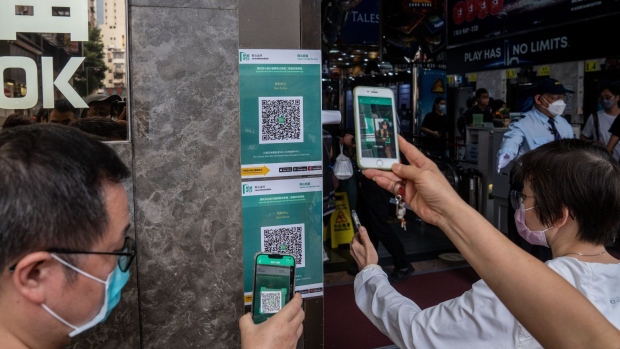Dec 12, 2022
Hong Kong Scraps Monitoring for Arrivals, Contact Tracing App
, Bloomberg News

(Bloomberg) -- Hong Kong is scrapping some of its last remaining Covid restrictions following China’s rapid shift away from the zero-tolerance approach.
The government will lift a ban on international arrivals going to bars or eating at restaurants, and stop requiring people to scan a QR code on their phones to enter venues, Chief Executive John Lee said at a press conference Tuesday. Some venues will still need proof of vaccination upon entry, he said, without mentioning whether the government intends to remove the mask mandate.
“All people want to have less restrictions as much as possible, while ensuring activities socially and economically can proceed as much as possible,” Lee said.
Covid curbs have hobbled the city’s economy and hurt its outlook as a financial hub. Economists expect gross domestic product to contract this year for the third time in four years, while the city’s population dropped the most in at least six decades in the 12 months through June as people fled the restrictions and a crackdown on dissent.
Analysts said the easing would help boost inbound tourism, though the bigger impact would come from a yet-to-be-confirmed relaxation of border controls with mainland China. Quarantine-free travel with the mainland may start as soon as next month for the first time in almost three years, according to local media reports.
“This swift adjustment is very positive for economic sentiment,” said Michelle Lam, Greater China economist at Societe Generale SA. “As for the economy, the real shift will happen when China reopens with the rest of the world, which could be happening soon.”
At a separate press conference later Tuesday, Secretary for Health Lo Chung-Mau detailed some measures including the scrapping of Covid tests at border control points for mainland travel and reduction in compulsory testing notices to buildings. Travelers still need a negative PCR test result obtained within 48 hours before entering the mainland and Macau.
But some curbs still remain, including the need for PCR tests for visitors arriving in Hong Kong and rapid antigen tests for school students. People should continue to wear masks outdoors.
At present, only about 1.6% of international arrivals test positive, compared with 2.5% of local residents, meaning the risk of importing the virus is low, according to Lo.
The city will likely be one of the biggest beneficiaries of China’s moves to exit Covid Zero and reopen its economy, Goldman Sachs Group Inc. economists said earlier this week. They estimated Hong Kong would get a 7.6% boost to GDP as exports and tourism income climb.
Stocks in the city extended gains after Lee’s announcement, with the MSCI Hong Kong Index climbing almost 2%. Mall operators surged, led by Wharf Real Estate Investment Co., while Jardine Matheson Holdings Ltd. Cathay Pacific Airways Ltd. rallied.
“This is for sure good news for Hong Kong economy as this could boost inbound tourism,” said DBS Bank Ltd. economist Samuel Tse. “A fundamental reversal would hinge crucially on the reopen of border with mainland China. After all, almost 80% of visitors to Hong Kong were mainland Chinese tourists.”
Hong Kong hosted about 250,000 arrivals in the first nine months of this year, compared with more than 46 million in the same period in 2018 — before citywide protests in 2019 curtailed travel and the pandemic closed the mainland Chinese border.
On the border, Lee said reopening will depend on how Covid develops in the mainland.
“Of course our goal is to resume normal travel as soon as possible, but we need to move this forward based on the actual situation,” Lee said. “As we all know, there are a series of things the mainland needs to consider, including the Covid situation, the number of confirmed cases and other related facilities.”
The moves came after Lee said on Sunday the government will conduct a full review of the city’s Covid measures, including the city’s Leavehomesafe app. Last week, Hong Kong said it would shorten the isolation period for people who test positive for Covid and their close contacts, and require two fewer rapid tests for inbound travelers. This is despite a recent rise in local cases. Hong Kong reported 14,717 cases on Monday, and 25 deaths.
--With assistance from Linda Lew, Jill Disis and Sofia Horta e Costa.
(Updates with details from health secretary starting in seventh paragraph.)
©2022 Bloomberg L.P.


